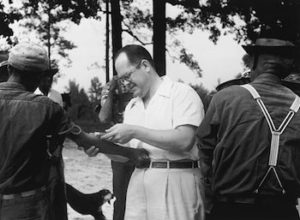
On this date, we remember the Tuskegee Syphilis Study. This American episode is part of the recurring chapter of racism against Blacks in the United States.
In 1932, the American government promised over 400 Black men, all poor residents of Macon County, Alabama, free treatment for Bad Blood, a euphemism for the syphilis epidemic in the county.
Treatment for syphilis was never given to the men and was strategically withheld. The men became unwitting subjects for a government-sanctioned medical experiment, The Tuskegee Study of Untreated Syphilis in the Negro Male. The Tuskegee Study lasted for four decades, until 1972, and had nothing to do with treatment. No new drugs were tested, and no effort was made to establish the efficacy of old forms of treatment.
It was a non-therapeutic experiment aimed at compiling data on the effects of the spontaneous evolution of syphilis on Black males. The Public Health Service (PHS) was interested in using Macon County Black citizens as a laboratory for studying the long-term effects of untreated syphilis, not in treating this deadly disease. The head of the PHS at that time was Thomas Parren Jr. and Taliaferro Clark.
The Tuskegee Study symbolized medical misconduct and blatant disregard for human rights in the name of science. The study's principal investigators were not mad scientists; they were government physicians, respected men of science, who published reports on the study in the leading medical journals. The study's subjects bear witness to the premise that the burden of medical experimentation has historically been borne by those least able to protect themselves.
The government doctors who participated in the study never obtained informed consent from the subjects in a study of a disease with a known risk to human life. Instead, the PHS offered the men incentives to participate: free physical examinations, free rides to and from the clinics, hot meals on examination days, free treatment for minor ailments, and a guarantee that a burial stipend would be paid to their survivors. This modest stipend of $50.00 represented the only form of burial insurance that many men had. By failing to obtain informed consent and offering incentives for participation, the PHS doctors were performing unethical and immoral experiments on human subjects.
From the moment the experiment began, the immorality of the experiment was blatantly apparent. Many critics of the Tuskegee Study draw comparisons to the similar degradation of human indignity in inhumane medical experiments on humans living under the Third Reich. How could such callousness happen outside Nazi Germany? To deny that race played a role in the Tuskegee Study is naive. All 600 subjects (399 experimental and 201 controls) were Black; the PHS directors and most doctors who studied them were white.
In July 1972, journalist Jean Heller broke the story. Under examination by the press, the PHS could not provide a formal protocol for the experiment; in fact, one never existed. While it was obvious to the American public, PHS officials maintained that they did nothing wrong. By the time the story broke, over 100 infected men had died, and others suffered from serious syphilis-related conditions that may have contributed to their later deaths even though penicillin, an effective treatment against syphilis, was in widespread use by 1946.
On July 23, 1973, Fred Gray Sr., a civil rights lawyer, brought a $1.8 billion class-action civil suit against many institutions and individuals involved in the study. Gray demanded $3 million in damages for each living participant and the heirs of the deceased. The case never came to trial. In December 1974, the government agreed to a $10 million out-of-court settlement. The living participants each received $37,500 in damages, and the heirs of the deceased, $15,000. Gray received nearly $1 million in legal fees.
Was The Tuskegee Study government-sanctioned, premeditated genocide? Were the subjects of The Tuskegee Study taken advantage of? Although the survivors and the families of the deceased received compensation, no PHS officer who had been directly involved in the study felt contrition. No apologies were ever tendered; no one ever admitted any wrongdoing. On the contrary, the PHS officers clarified that they acted in good conscience. They felt betrayed by the government's failure to defend their commissioned study. But as one survivor said, "I don't know what they used us for. I ain't never understood the study." Arthur Kaplan, Ph.D., director of the medical ethics program at the University of Pennsylvania in Philadelphia, described the Tuskegee study as "America's Nuremberg."
To promote healing, (then) President Clinton offered a formal apology on May 16, 1997. The president praised the survivors for their spirit of forgiveness, saying, "Today, all we can do is apologize, but you have the power. Only you have the power to forgive. Your presence here shows us that you have shown a better path than your government did so long ago. You have not withheld the power to forgive. I hope today and tomorrow every American will remember your lesson and live by it." The former president announced government bioethics fellowships for minority students funded by the Department of Health and Human Services. He also proposed a $200,000 planning grant for a bioethics center at Tuskegee University, which was not affiliated with the study but whose reputation has been tarnished by it.
As of 2002, on the 50th anniversary of the Doctor's Trial in Nuremberg and the 25th anniversary of the end of the Tuskegee study, researchers, the public, and the U.S. government are still coping with the damage caused by the Tuskegee study. Ernest Hendon, the last citizen of the study, died in 2004.
In June 2022, the New York Fund, which financed the original study, publicly apologized for its role in the experiment.
Tuskegee Syphilis Experiment.weebly
Tuskegee's Truths:
Rethinking the Tuskegee Syphilis Study
Studies in Social Medicine
by Susan M. Reverby
University of North Carolina Press
Copyright, July 1, 2000
ISBN: 0807825395